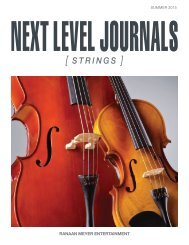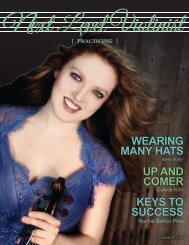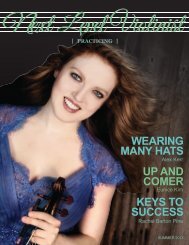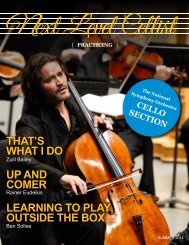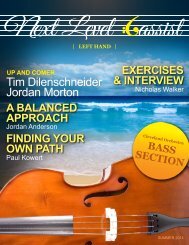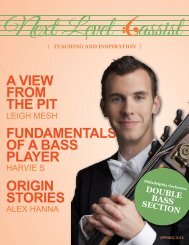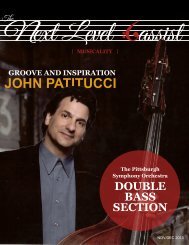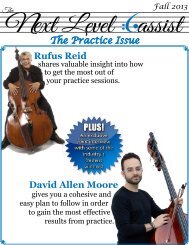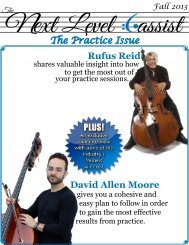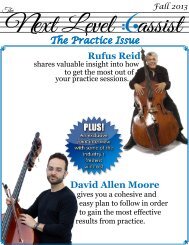Next Level Cellist Musicality Issue
Featuring articles by Alisa Weilerstein and Efe Baltacigil, a spotlight on the Chicago Symphony Cello section, and a duet by Ranaan Meyer
Featuring articles by Alisa Weilerstein and Efe Baltacigil, a spotlight on the Chicago Symphony Cello section, and a duet by Ranaan Meyer
You also want an ePaper? Increase the reach of your titles
YUMPU automatically turns print PDFs into web optimized ePapers that Google loves.
with the sound of the double bass, and its warm depth. It’s a quality<br />
of sound I look for in every new instrument I try, just as important<br />
as a singing A string. You want that fulfillment all around you when<br />
you play the low notes of a string quartet or solo line, or in the cello<br />
section. We spend a good amount of time in first position, and it’s<br />
vital to have a complete and well informed bass sound concept.<br />
BEING A COMPLETE MUSICIAN<br />
<strong>Cellist</strong>s have a unique set of roles to play in any genre. We can be the<br />
foundation of the music, then support the melody, then play melodies<br />
of our own, sometimes in a very short span of time. Not only that,<br />
but we sometimes move from string quartet to cello section<br />
to soloist in front of an orchestra almost as quickly.<br />
You have to be musically sensitive, because you won’t<br />
make any friends in your string quartet by playing like<br />
you’re performing the Dvorak Cello Concerto!<br />
You have to switch certain things, and be capable of<br />
taking a supporting role. In truth, you have to recognize<br />
that there are even moments in your concerto when<br />
your job is to accompany the violins or the flute with<br />
the melody. It all comes down to being familiar with the<br />
score in all settings. It’s a good thing to know what the<br />
second flute, for instance, is doing at all times. If you<br />
aren’t familiar with that, you lack the ability to know<br />
what the composer really meant for your own role.<br />
I spend time looking at free scores from IMSLP all the<br />
time. Recently, I was able to use the original manuscript<br />
in Beethoven’s hand for a recent performance of his 6 th<br />
Symphony. It’s all readable, although it takes a few pages<br />
to get used to the handwriting. You can see his thought<br />
process, mistakes, his scribblings! If you really want to<br />
do well, it’s a good idea to learn what’s going on. Week<br />
in and week out I study the scores of the repertoire<br />
to get a little bit closer to understanding. Having this<br />
knowledge of other instruments’ parts gives me wonderful<br />
guidance, it keeps me from being a fish out of water.<br />
A CHALLENGE<br />
I would like to encourage every musician out there to get a little<br />
more deeply in touch with his or her musicianship with this exercise.<br />
Imagine you are being asked by a radio station to program 45 minutes<br />
of your favorite classical music as a guest DJ. What would it be? What<br />
would it say about your tastes, your interest in different composers<br />
or ensembles? Once you are able to do this, try making a 45 minute<br />
definitive mix of your favorite music of any genre. I guarantee it’s<br />
challenging, because it was really quite hard for me to do it. I was<br />
asked by a Seattle radio station to do exactly this, and you can see my<br />
responses here. Listening is crucial, loving music even more so. Find<br />
what makes you inspired and capture that same feeling when you sit<br />
at the instrument. Anybody can make their musical ambitions reality,<br />
by working hard and keeping an open mind.<br />
SPRING 2014 NEXT LEVEL CELLIST 13




